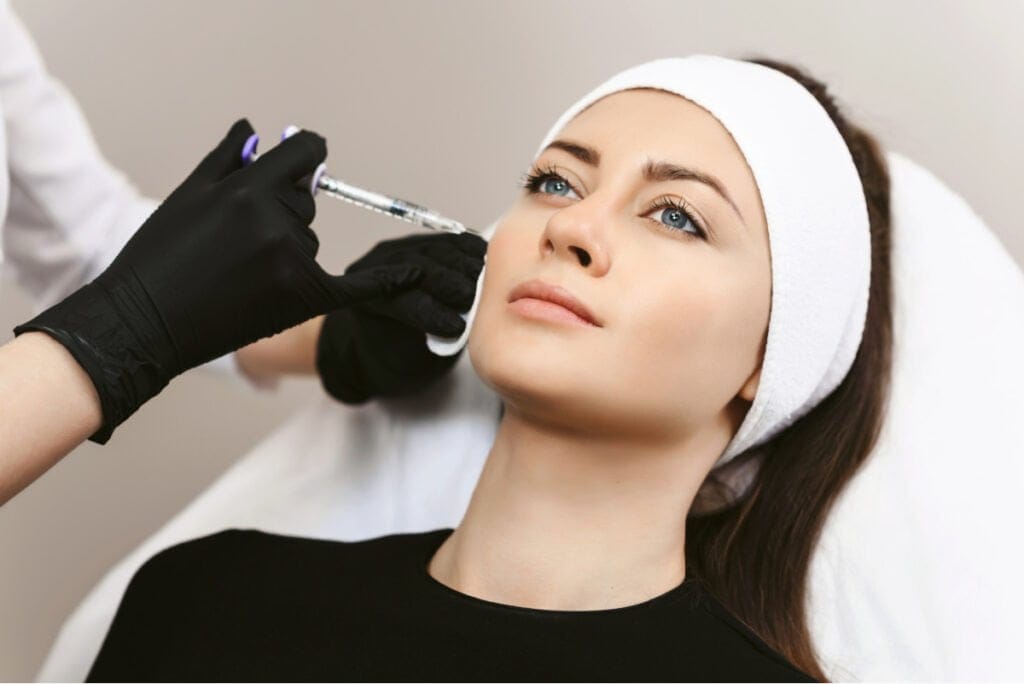
Two new cosmetic injectables—Restylane Contour® and Revance’s Botox-like neuromodulator, DaxibotulinumtoxinA®—are set to make waves in the aesthetics community this year. With the demand for dermal fillers and neurotoxins continuing to rise, these products may play a role in advancing the efficacy of cosmetic injections. From how they work and what they can treat to where you can find them, here’s what we know so far about these new products.
Restylane Contour®: all about the newest cheek filler
Restylane Contour® is a new injectable dermal filler designed to add shape and volume to the cheeks. It is composed of hyaluronic acid (HA), a naturally occurring substance present in the skin that keeps it plump and hydrated. As we age, hyaluronic acid levels naturally diminish, causing skin to sag and wrinkles and folds to appear. HA-based fillers like Restylane Contour work to stimulate the body’s collagen production to reverse age-induced volume loss, or just give the skin an extra ‘boost.’
How does it work?
Restylane Contour is formulated with Galderma’s proprietary XpresHAn Technology™, which creates a smooth, injectable gel that integrates into the skin, allowing for natural expressions that move with the rest of your face. Unlike other HA cheek fillers, Restylane Contour isn’t designed to correct volume loss alone: it is also intended to subtly enhance the cheeks, improving contour and definition.
Restylane Contour’s formula was designed to be soft and flexible enough for your face to look beautiful at rest and when you smile and talk, yet firm enough to retain its volume and shape over time. It was proven to be effective with both needle and cannula injection, and may be administered using either method depending on the preference of your provider and your aesthetic goals.
Restylane Contour is a smooth, injectable gel that volumizes the cheeks and allows for natural expressions that move with the rest of your face.
What can it treat?
Restylane Contour is FDA-approved for cheek augmentation and the correction of midface contour deficiencies. It may also be used as a temporary alternative for those considering permanent surgical options like fat grafting, cheek implants, or a facelift.
How effective is it?
Lifespan. Restylane Contour has been shown to last between 12 to 18 months.
Efficacy. During its first clinical trial, 270 patients were evaluated over a 48-week period. 98% of patients were pleased with their results at one year and required less volume than those treated with the study’s other filler to achieve their desired results.
Onset. Most patients can expect to see results immediately after their treatment, but full results may take 1 to 3 weeks to develop.
Is Restylane Contour® FDA approved?
Restylane Contour gained FDA approval in June of 2021. Though Restylane Contour is new to the U.S., its XpresHAn Technology has been used in Galderma’s European filler brand, Restylane Volyme®, since 2010.
Revance’s DaxibotulinumtoxinA®: all about the newest neuromodulator
Watch out, Botox®—Revance Aesthetics (the creator of the RHA® Collection of dermal fillers) has a new injectable neuromodulator pending FDA approval. DaxibotulinumtoxinA® for Injection (DAXI) is intended to last longer than the currently available forms of botulinum toxin type A (Botox, Dysport®, Jeuveau®, and Xeomin®, respectively), and is showing promising results in clinical trials. By combining a highly purified version of botulinum toxin type A absent of any human or animal-based components with a proprietary stabilizing peptide, DAXI is intended to be a more ‘natural’ neuromodulator.
How does it work?
Similar to other Botox-like injectables, DAXI works by temporarily paralyzing the facial muscles responsible for causing static lines and wrinkles (those visible when your face is at rest).
By combining a highly purified version of botulinum toxin type A with a stabilizing peptide, DAXI is intended to be a more natural neuromodulator.
What can it treat?
DAXI is currently pending FDA approval for treatment of moderate to severe glabellar lines (the frown lines that run between the nose and mouth). It was subjected to 3 clinical trials, with the following results reported at week 4 after treatment:
- Over 73% of patients achieved significant improvement in their glabellar lines (as assessed by the patient and the researcher).
- 97.5% of patients responded to DAXI.
- 96% of patients were satisfied with their results.
How effective is it?
How effective was DAXI in treating frown lines? We highlighted results from the 3 clinical trials below:
Lifespan. Data from the second trial showed DAXI to be effective for a median duration of 6 months, with baseline wrinkles returning after 28 weeks. Revance will recommend patients undergo follow-up treatments every 6 months to maintain optimal results.
Efficacy. In addition to longer-lasting results, DAXI has been shown to smooth glabellar lines using less neurotoxin, which may be thanks to its “purer” formula. (40 units of DAXI contains the same amount of neurotoxin as a 20 unit dose of botulinum toxin type A and can provide the same result.) Researchers from the clinical trials also noted that DAXI provided superior results when comparing equal 20 unit doses of it to other brands of botulinum toxin type A.
It’s also worth noting that approximately 50% of study participants had used a Botox-like injectable other than DAXI within the last 23 to 32 months.
Onset. DAXI’s median onset time was 3 days in each study, similar to the time it takes other Botox-like treatments to take effect. (Note: onset time is not the same as the time required to see full results. Full results typically take 7 to 14 days to appear with botulinum toxin type A products.)
When will DAXI® receive FDA approval?
DAXI has successfully completed the third and final phase of its clinical trial program, and is currently under review for FDA approval for the treatment of glabellar lines.
Revance is also evaluating DAXI for the correction of forehead lines and crow’s feet, as well as in two therapeutic indications: neck muscle spasms and upper limb spasticity. DAXI is currently in Phase 2 of testing for these uses.
Is DAXI® safe?
Because DAXI is chemically similar to Botox and other Botox-like brands, which have an extensive safety record, DAXI is considered to be very safe. In fact, DAXI may be safer than other Botox-like products for a few reasons:
- Unlike Botox, DAXI is stable at room temperature and doesn’t require refrigeration.
- DAXI doesn’t contain albumin, a blood-derived protein used in other botulinum toxin brands (with the exception of Xeomin) as a stabilizer to protect the neurotoxin complex during manufacturing, shipping, storage, and administration. Albumin carries a very remote risk of viral disease transmission.
Where can I find these new injectables?
As the popularity and ubiquity of cosmetic injections has increased over the past decade, so has the number of under-qualified providers. Choosing a board certified cosmetic surgeon to perform or oversee your cosmetic injections will help ensure you receive safe and beautiful results. To find a cosmetic surgeon near you to perform your Restylane Contour or DAXI injections, use our ABCS Find-a-Surgeon tool.






